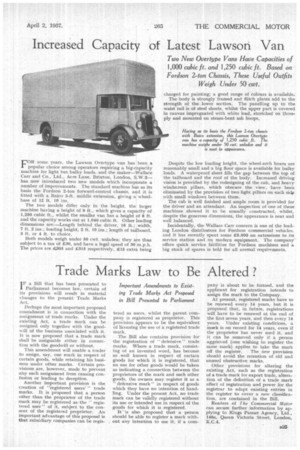Trade Marks Law to Be Altered ?
Page 39

If you've noticed an error in this article please click here to report it so we can fix it.
Important Amendments to Existing Trade Marks Act Proposed in Bill Presented to Parliament
I F a Bill that has been presented to Parliament becomes law, certain of its provisions will result in material changes to the present Trade Marks Act.
Perhaps the most important proposed amendment is in connection with the assignment of trade marks. Under the existing Act, a trade mark can be assigned only together with the goodwill of the business associated with it. It is now proposed that a trade mark shall be assignable either in connection with the goodwill or without.
This amendment will enable a trader to assign, say, one mark in respect of certain goods, while retaining his business under other marks. Certain provisions are, however, made to prevent aby such assignment from causing confusion or leading to deception.
Another important provision is the creation of "registered users'" trade marks. It is proposed that a person other than the proprietor of the trade mark may be registered as the " registered user" of it, subject to the consent of the registered proprietor. An important advantage of this proposal is that subsidiary companies can be regis tered as users, whilst the parent company is registered as proprietor. This provision appears to be the equivalent of licensing the use of a registered trade mark.
The Bill also contains provision for the registration of " defensive " trade marks. Where a trade mark, consisting of an invented word, has become so .well known in respect of certain goods for which it is registered, that its use for other goods would be taken as indicating a connection between the proprietors of the mark and such other goods, the owners may register it as a "defensive mark" in respect of goods which they have no intention of handling. Under the present Act, no trade Mark can be validly registered without its use or intended use in respect of the goods for which it is registered.
It is also proposed that a person should be able to register a mark without any intention to use it, if a com
pany is about to be formed, and the applicant for registration intends to assign the mark to the Company., At present, registered marks have to be renewed every 14 years, but it is proposed that, in future, registrations will have to be renewed at the end of the first seven years, and then every 14 years. Under existing conditions, a marrk is on record for 14 years, even if the proprietor has never used it, and it can be removed only if a person aggrieved (one wishing to register the same mark) applies to take the mark off the register. The new provision should avoid the retention of old and unused obstructive marks, Other provisions for altering the existing Act, such as the registration of a trade mark for export trade, alteration of the definition of a trade mark effect of registration and power for the registrar to adapt existing entries in the register to cover a new classification, are contained in the Bill.
Readers of The Commercial Motor can secure further information by applying to Kings Patent Agency, Ltd., 146a, Queen Victoria Street, London, E.C.9.




























































































